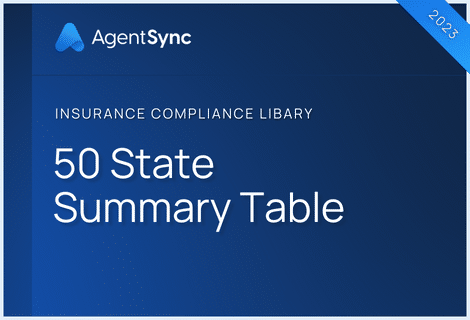

When it comes to keeping your insurance agency in compliance, one common question is whether you need to register your business entity with a given state’s secretary of state. And the answer is yes. Or no. Or maybe?
If you’re looking to get a more nuanced answer than just the black-and-white binary that isn’t particularly useful, then you’re in the right place – let’s look at when you might consider registering, and the particulars of a few states and circumstances.
Do I need to register my insurance agency with a secretary of state?
There’s no single answer to this basic question of insurance agency compliance, because this is the insurance industry. Yet, because this is compliance, and in compliance we err on the side of overcaution, there’s not really a point where we’re going to confidently say you don’t need to register with the secretary of state. Rather, here are three situations where you may need to register with the secretary of state, and some nuances to think about while you mull it over.
- You’re starting a business entity/insurance agency with multiple agents on your staff
This is the most obvious scenario in which you’ll need to register with a secretary of state. If you are beginning a firm, agency, or insurance business entity of some kind, and you plan to have multiple agents working under you, or you have multiple agents who own the firm, you need to register with your resident or home state secretary of state, period.
You’ll want to register with the secretary of state and get a federal employer identification (EIN) number from the IRS. These are, of course, the basics of setting up any business, regardless of the industry. Insurance, however, adds a few additional steps to the process, such as considerations for whether to register your business first or get a business license first, or whether you have naming restrictions regarding your legal name or “doing business as” (DBA) names.
- You’re starting a business entity or insurance agency as a sole proprietor
You should almost always register your newly formed insurance agency as a business with your resident or home state secretary of state. The qualifying “almost”: Some states don’t allow businesses formed as sole proprietors to register. So, if you own a business and you’re the only agent, or if you own a business that only has one affiliated agent, you likely have to register with the secretary of state, but in some cases you can’t.
- You’ve founded a business entity or insurance agency and are looking to move into a new state
In this situation, we’re assuming you’re an existing business with lots of history and you’re ready to expand into new territory. You’re ready to cross into a new state or jurisdiction, and things are starting to get muddy because it turns out the new state doesn’t operate at all similarly to your current state, or states, of operation.
Here, the answer is a solid, “Maybe.” Most states are fairly ambivalent about whether “foreign” business entities should register in their state. Again, whether your business is a sole proprietorship with a single affiliated agent, or whether your business has multiple agents and co-owners will affect this answer.
The jurisdictions that require all business entities to register with their secretary of state (or equivalent) if they operate “foreign” businesses (aka, businesses not domiciled or headquartered in these states) include:
- Alabama
- Delaware
- Georgia
- Guam
- Idaho
- Massachusetts
- Montana
- New Hampshire
- New York
- Ohio
- Pennsylvania
- Puerto Rico
- Texas
- U.S. Virgin Islands
- Vermont
- Virginia
Now, just because a state/territory isn’t on this list doesn’t mean you shouldn’t register there. There are plenty of other reasons to register with the secretary of state, not least among them is to claim your rights to your business name or get approval for your business or DBA name.
- You’re opening a new branch location
If you’re opening a new branch location, you don’t need to register. Probably. Most states require only the main branch of an agency to be licensed, and otherwise don’t require new branches to notify the SOS or DOI. But, some states require the agency to notify the secretary of state or department of insurance of new branches. And a few states require branch locations to obtain a new license entirely.
Beyond these variations, the definition of what constitutes a branch in each state matters, as well. This became a point of contention early in the COVID-19 pandemic as some states doubled down that agents working from their own homes would need to register their residences as branches.
Thanks to the normalization of work-from-home policies, this is an evolving area of regulation. For instance, California requires registration of branch locations based on whether it stores records (which can be confusing in today’s world of cloud-based record-keeping). And Texas’s changes in mid-2021 relaxed branch regulations precisely because the state didn’t want a newly remote workforce to storm the office with residential branch registrations. Conversely, Florida requires all “branch” locations to be open to the public and registered with the state, which could include someone’s personal home office.
The question of whether to register a location with the secretary of state isn’t the only operational piece to grapple with when opening or expanding your business entity’s footprint (and hopefully market share, amirite?).
Other considerations for business entities
Does my agency or business entity need an insurance license to operate in a different state?
Almost always, the answer is yes.*
*There are some nuances here based on whether a state regulates a certain kind of insurance, or whether a state requires the branch to have a license but not the main business, or whether the main agency business needs an insurance license, but a physical branch location can forgo licensing, and fiddly particulars like that. But, if you’re looking for a blanket rule, that rule is: Your insurance agency needs a license to operate in a state.
If you need something more state-specific, check a particular state’s rules in the jurisdiction-by-jurisdiction requirements at the Compliance Library.
Chicken or egg: Should I register my insurance agency with the secretary of state or get a license with the department of insurance first?
If you didn’t guess that it depends on the state, you probably are new to insurance. In Alabama, Massachusetts, Montana, New York, Ohio, Puerto Rico, and Vermont, the state/jurisdiction prefers that you register your agency with the SOS before obtaining a license from the DOI.
Conversely, Hawaii requires you to first obtain an agency-level insurance license before the secretary of state will approve your business entity application. And Nevada doesn’t require agencies to get a license before registering with the SOS, but your business entity application fees are significantly lower in that state if your application includes a DOI license number.
Meanwhile, Virginia doesn’t necessarily require you to file with one sooner than the other, but if you don’t have an SOS-issued certificate for your business within 90 days of getting your agency license, the state will cancel your agency license.
And, as a final note of caution, in case you thought expanding your agency would be easy: Not all jurisdictions value speed. At least one territory, Puerto Rico, cautions agency applicants: The whole process from tip to tail may take more than two years.
If you’re setting up an agency or expanding your jurisdictional territory and you want a roadmap of what to look out for from a compliance standpoint as you move into new states, check out our guide, How to Start an Independent Insurance Agency. But if you’re looking to tighten up your existing business channel, check out what AgentSync can do for you.

